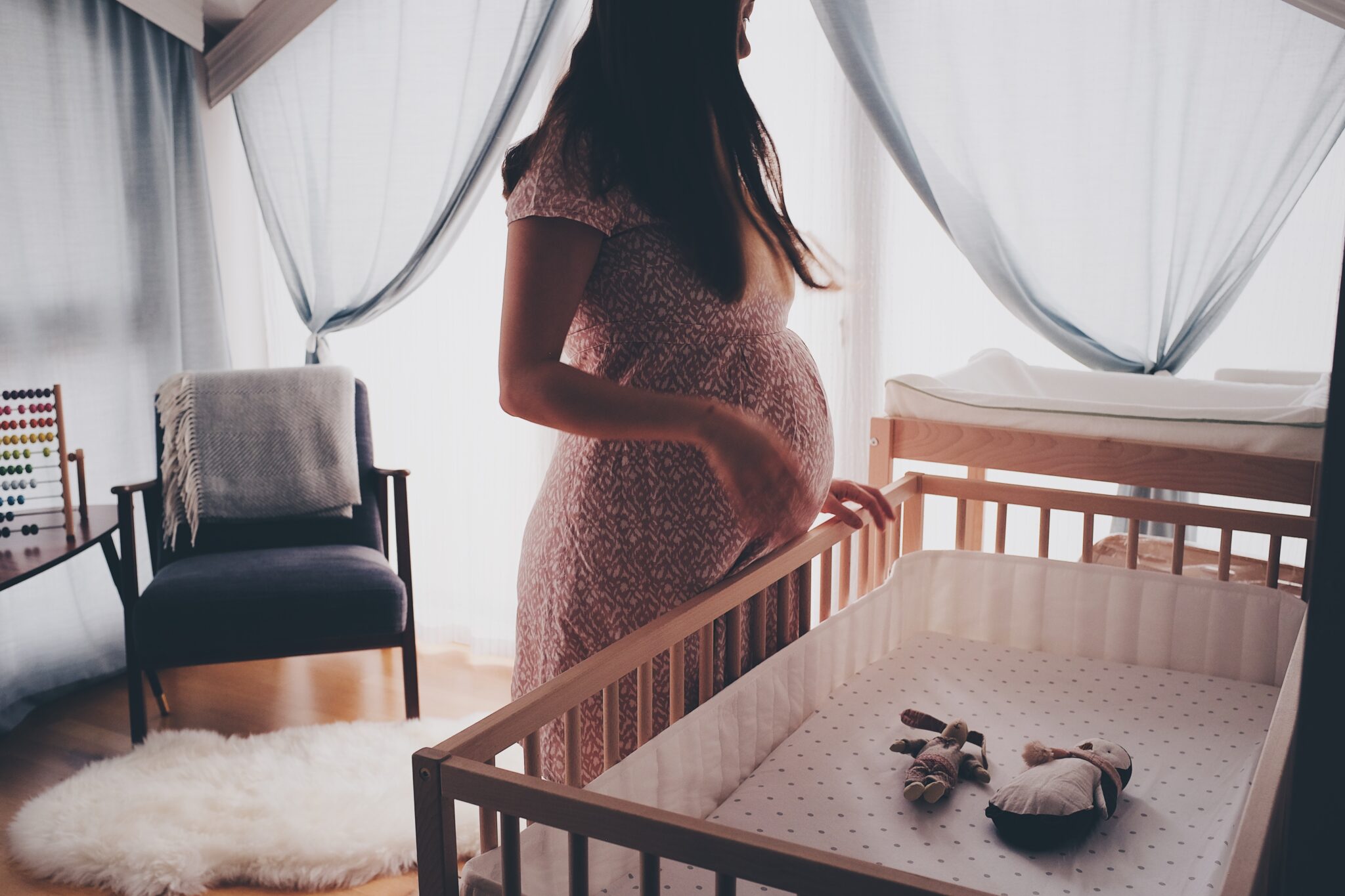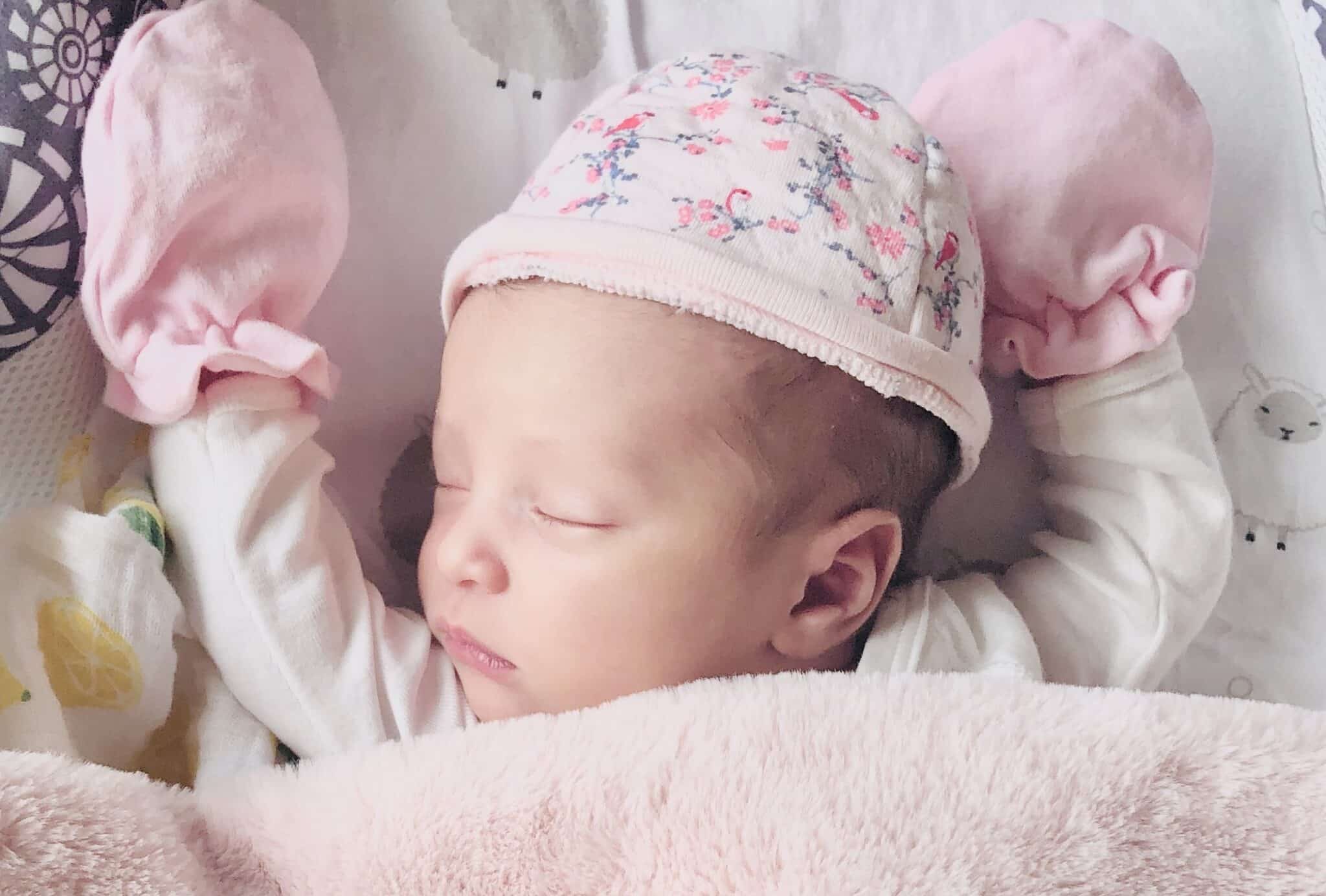
Babies often have trouble falling or staying asleep at night. It can take weeks, sometimes months, before they start sleeping more soundly. Every parent will face this challenge so it’s important to have a sound plan in place early on. And while each baby is different and the effectiveness of strategies vary, the key to success is to establish a consistent routine and take a longer term approach. After all, Rome wasn’t built in a day and babies need time to learn how to sleep.
Just like adults, babies have to feel relaxed and comfortable in order to sleep soundly so the more you make them feel secure, comfortable and relaxed, the greater the likelihood of a good long sleep. And once you get them sleeping well and for longer, it’s just a matter of time before they eventually sleep through the night!
We’ve interviewed scores of parents and experts (plus our own experience for good measure) to give you the top 10 strategies which will help to get your baby to sleep. You will need to experiment to see which of these helps the most, but once you identify what works, remember to be as consistent as possible. Finally, bear in mind that the end goal is for your baby to sleep on it’s own without any aides and so these strategies are best used in the short term (under a year).
So here are the top 10 most effective strategies for getting your baby to sleep:

1. Satisfy Basic Needs
Although this may seem obvious, many parents forget that babies will only sleep well when all their basic needs are met. Hunger is top of the list, and babies won’t fall (or stay) asleep if they are still hungry, so be sure to keep track of how much you give them throughout the day to ensure it’s enough. On the flip side be sure to not overfeed your little one as this will likely lead to an upset stomach, which in turn will wake your baby.
Besides a satisfied and happy tummy, make sure your baby is ‘fully burped’ or else gas could cause discomfort and your baby may struggle to stay asleep. Be sure to burp newborns for at least 2 minutes with light taps and rubbing or upward pressure on their backs.
Finally, be sure to check diapers before putting your little one to sleep since a wet diaper will cause some discomfort and besides being unhygienic, could cause your baby to wake. Note that babies tend to become aware of having a wet diaper around 2- 3 months.

2. Make Your Baby Feel Cozy
You should change your baby into pajamas (ideally after a bath) before bed time. There’s something about a soft pajama that is relaxing for a baby so be sure to buy soft materials like pima cotton, or even a breathable fleece. Babies love cozy pajamas even in warmer climes since it reminds them of being back in the womb. Just be sure to keep the temperature set to low 70s (Fahrenheit) and monitor your baby’s temp to ensure s/he is warm but doesn’t sweat.
In addition to pajamas, swaddles and sleep sacks will help keep your baby warm and cozy. Swaddles for newborns and sleep sacks with for older babies. Swaddling is particularly important for newborns because wrapping their arms by their sides helps ensure they wont get woken up by their own startle reflex and ensures they feel safe and secure. Most babies love being in a sleep sack as long as it allows them some freedom of movement, so you will need to experiment to see what works. We highly recommend the butterfly type sleep sack from Love to Dream and recommend starting the fully enclosed sleep sack around the second or third month, then transitioning to one that allows for arms to move freely by the 4th or 5th month. Another benefit of using a sleep sack is that functions like a blanket without the risk of suffocation.

3. Use a White Noise Machine
White noise works by approximating the same noise your baby was used to hearing in the womb. It also drowns out background noises like street sounds or anything which could wake the baby up, such as a squeaky door. British scientists at the Institute of Obstetrics and Gynaecology first discovered in the 1990s that white noise helps lull babies to sleep and keeps them asleep for longer, which is why it’s very useful to have one.
There are tons of white noise machines but not all are quality products. In fact, we no longer recommend fan-based white noise machines since we discovered in our own research that these generate high EMF (electromagnetic) levels, which clearly isn’t safe for a baby. As such, we recommend a quality product that produces low EMF such as the Hatch Baby Rest Sound Machine. It has many white noise sounds as well as other calming sounds like a babbling brook, and also doubles as a night light.

4. Shoosh as Needed
Never have parents felt more empowered to shoosh! Besides working well with crying babies, it also helps at bed time, especially when combined with the other actions above. The key to shooshing is doing a soft gentle and repetitive shoosh. We recommend a slow drawn out shooooosh when baby is sleeping and then three ‘shoosh shoosh shooshes’ when your baby is crying. The long slow shoosh will actually be therapeutic for you as its a form of breathing exercise i.e. meditation 🙂
While shooshing may work better when your baby is a newborn, you can continue to use as needed when your baby is more mature. Just be sure to be consistent once you figure out what works for your baby!
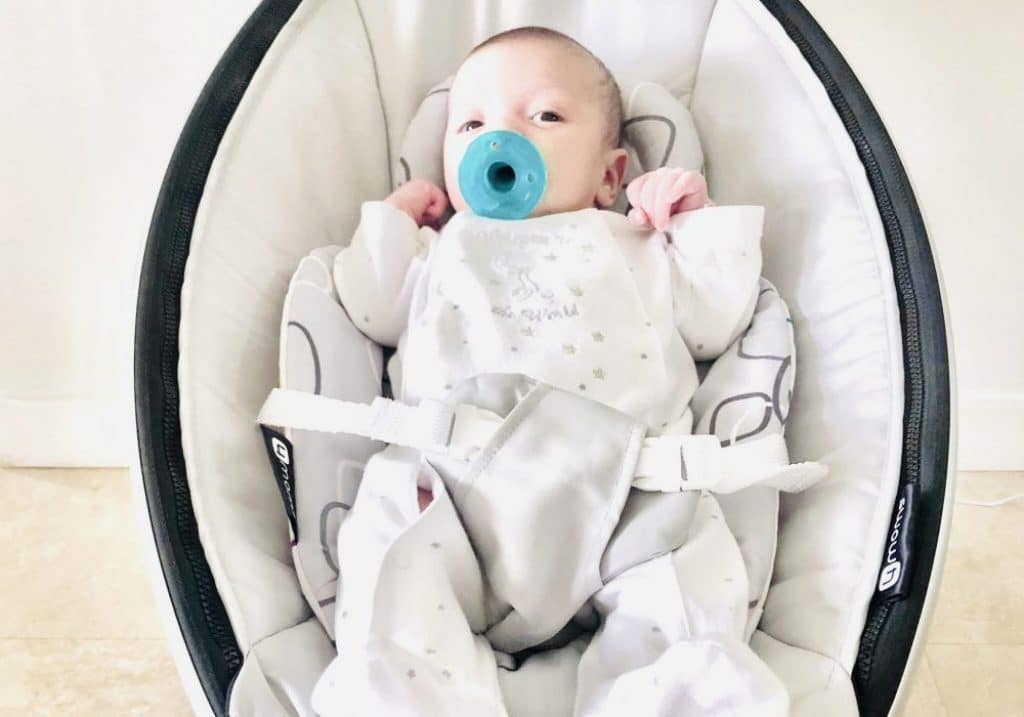
5. Rock or Swing Your Baby
While every baby is different, rocking or swinging can help lull your baby into a relaxed state of mind and is perhaps the most effective way to calm a fussy baby or overstimulated baby. You have to experiment to see what works best, but we recommend rocking your baby in your arms while standing or sitting your bed or sofa. Mechanical swings can also help when you baby is overstimulated or fussy but we generally recommend using these during the day. Checkout our best baby swings shortlist.
Either way, if your babies needs have been met and it is cozy then rocking/swinging will be icing on the cake and your little one will be ‘sleeping like a baby’ in no time. You may want try rocking your baby to music and away from where it will sleep and most important of all, you don’t want to do big movements! You never want a baby’s head to bobble so do smooth, repetitive movements side to side or front to back while holding your baby securely.
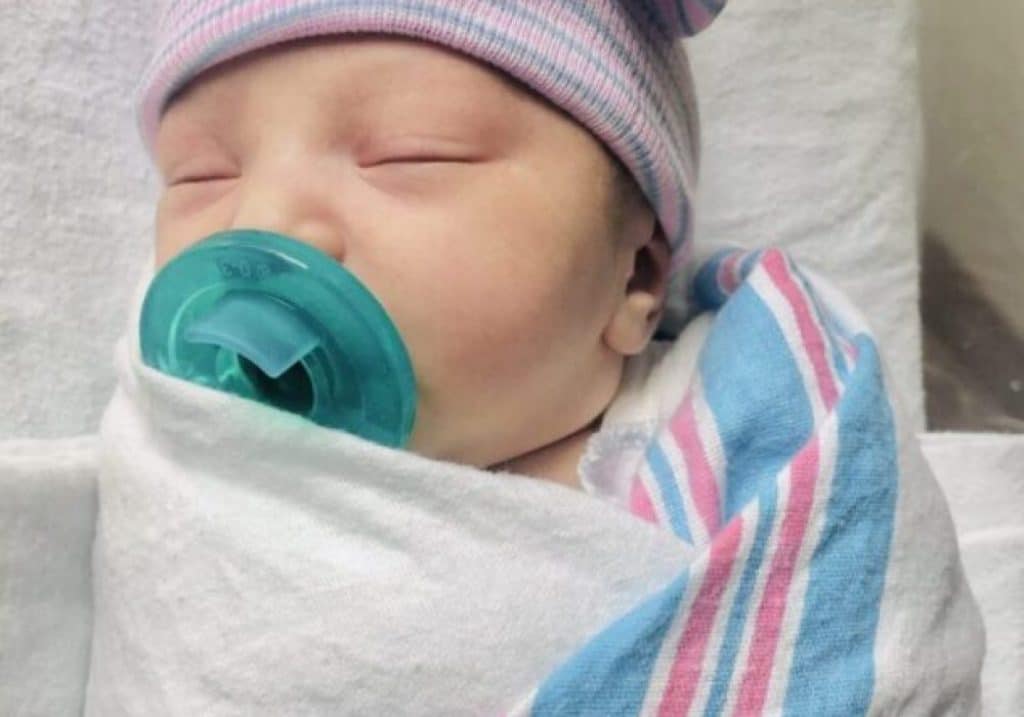
6. Use Pacifiers As Needed
There is something about sucking that is stress relieving for babies. It also takes their attention away from whatever it is that is bothering them and lulls them into a relaxed state of mind. The pacifier is so versatile that you can use it in many situations. For instance, you can use a pacifier half an hour before putting your baby to bed, possibly while rocking, in order to calm your baby down. Or you could use the pacifier when your baby is sleepy but simply cannot fall asleep. In this case you would let your baby soothe itself to sleep.
You will need to experiment to see what works for your baby- particularly the type of pacifier. We recommend the larger pacifiers for newborns and smaller ones for more mature babies. Note that some babies may develop a dependency and so you have to take things in strides and like everything, use in moderation. Since the objective is to get your baby to sleep then remember that it’s OK to use a pacifier as long as it’s in the short term. Just bear in mind that once your baby starts sleeping better you should gradually reduce using.
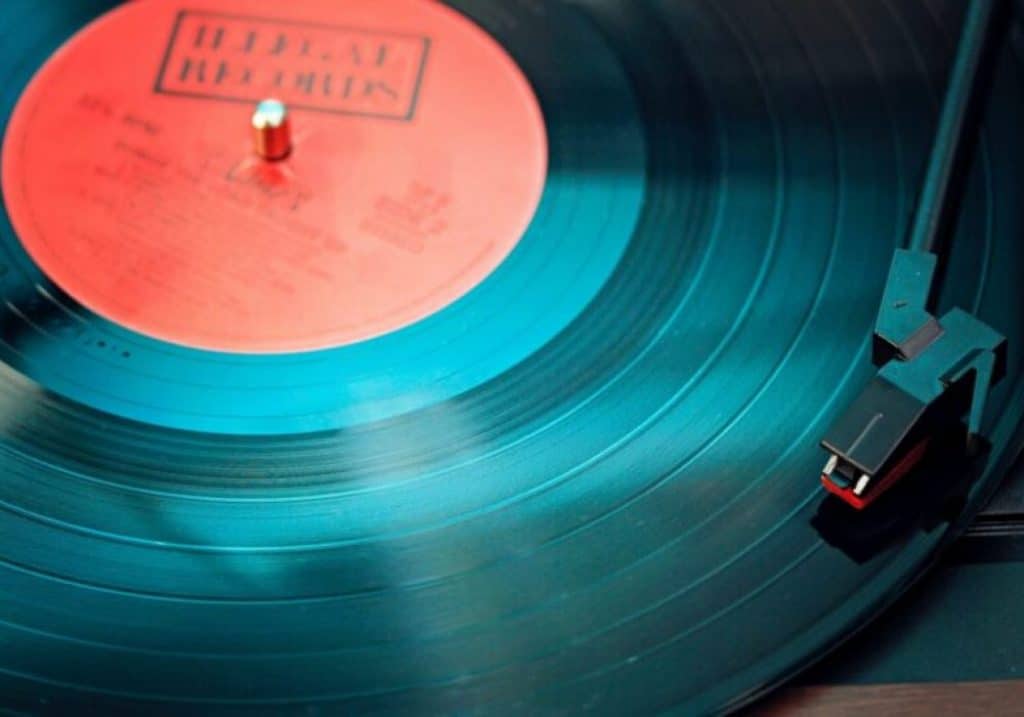
7. Calming Music Before Bed
Babies love music and are deeply affected by rhythm so if you want to calm a fussy baby before bed time start playing music on its frequency then transition to slower tempo songs. You basically want to end up listening to some calming music where the tempo is consistent and that there aren’t any sharp, high pitch noises or loud percussions which could startle your baby.
We’ve collected feedback from many parents and noted that babies like genres such as jazz, classical guitar and classical piano but you have to simply experiment to see what works best. While jazz and other genres can generally be calming, some songs may have some loud parts or transitions with loud sounds so choose wisely. Funnily enough, many ‘baby’ or ‘calming’ playlists on Spotify and other music platforms don’t make the cut because they feature songs all kinds of strident noises such as a saxophone riff. So best option is to make your own mix!

8. Keep Baby's Room Dark Yet Cozy
Another thing you can do to help your baby is ensuring a dark and cozy room for your baby to sleep in. Not pitch black but dark. This could be your own bedroom or the baby’s own room as long as there aren’t any distracting lights. Some parents think a dark room would be scary for a baby but if you think about it, your baby was in darkness for 9 months and was perfectly content. Bright lights will stimulate your baby so even in the day time you will want to close your curtains or blinds.
We don’t recommend making the room too dark during the day since it’s important for babies to get used to day vs night rhythm and sleep mostly at night. The only difference of course is that at night it will be very dark (depending on whether you live in a city or not) so always make sure you have a night light on in the room or some kind of baby light like Hatch set to low. Again, you want to have a dark room not completely pitch black.
Finally, be sure you to turn off (or at least completely dim) your phone and any electronic devices display since the blue light emitted will not only wake your baby but also interfere with the chemicals that influence sleep hormones. Note that electronic devices should be kept more than 5 feet from your baby since they generate magnetic fields which are harmful at close proximity and interfere with sleep.

9. Make Sure Your Presence Is Felt
Being held and close to you is super important for a baby especially in the first 6 months, and especially before it falls into a deep sleep. This is because babies are programmed with survival mechanisms to ensure you wont abandon them. In fact it’s well known some babies will peek to see if you are still in the room, so the best thing to do is stay in the room for a good 20 minutes after you have put your baby to sleep. After you have done this for weeks you can then graduate to the next level and simply be in the room next door from your baby so that if it wakes (and it will) you can then quickly comfort it so that your baby knows you are always there for them.
This is all about trust as the baby needs to know it can count on you to protect him/her. Trust takes time and once your baby trusts that you are reliable he or she will begin to sleep more soundly. If your baby is extra fussy babies that needs extra attention, can simply sit next to their bassinet/crib and they will sense your presence (smell, movement, breathing, etc) or they can hear your talking in the room next door. Bring an ipad or book (which you can read with a night light) and play tag team with your partner. If you do this, they will learn to trust you and fall asleep faster and sleep longer.

10. Bath Time
A nice warm bath will not only calm your little but also signal to your baby that it’s time for bed. We recommend giving your little one a bath in the evening at least an hour before bed. Be sure to use a thermometer to make sure the bath isn’t too hot (around 100 F is ideal). Getting into a routine doesn’t work right away and many newborns simply hate baths at first but if you smile and play with them, they will soon start to enjoy bath time. You will discover that your baby will begin to enjoy the sensation of feeling the warm water and even enjoy the massage like movements of your sponge.
The warm water and smell of soap can also serve as aromatherapy for your baby. We love Mustela Gentle Cleansing Gel, which smells wonderful – clean and cozy with notes of lavender and chamomile. After the bath, we also recommend to briefly massage your baby with baby massage oil and changing him/her into a cozy pajama.
Bonus

Lavender and chamomile essential oils are safe to use for babies although be certain to use very very little – a drop or two in a tissue and never on or close to the baby! Both are known to induce a calming effect but be sure to use sparingly and consult your pediatrician first. We recommend buying pure essential oils but using very little (again a few drops). It’s also very important to buy a well-regarded brand like Aura Cacia since there are far too many fake or adultered essential oils on the market. You can also buy a room spray and spray a few puffs in the air. Aura Cacia sells a nice Aura Cacia Lavender Mist. At any rate, do your homework and avoid synthetic fragrances at all cost! You don’t want any harsh chemicals around your baby and while some fanatics argue all essential oils are bad for babies (we agree that many are), lavender and chamomile are safe. Again, always consult with a doctor.
And once you’re able to get your baby to sleep you will need a good baby monitor in order to ensure he or she is safe. A good baby monitors let’s you get on with your life without having to worry about your baby’s well being. Good baby monitors have good audio and visual on your baby thereby giving you peace of mind without over complicating or stressing you out. Have a look at our top picks by clicking below.



